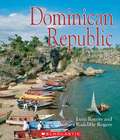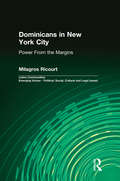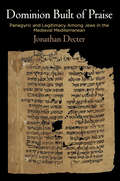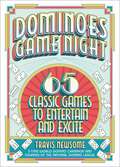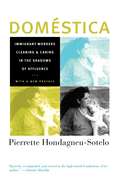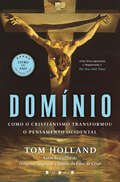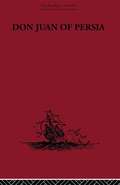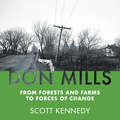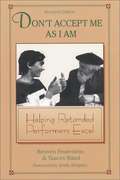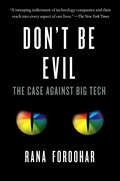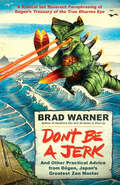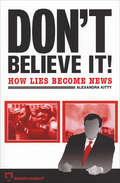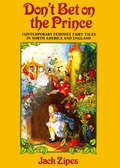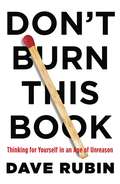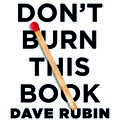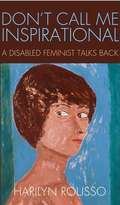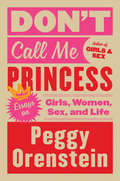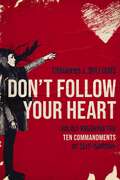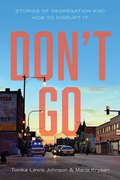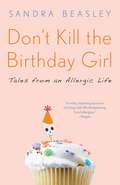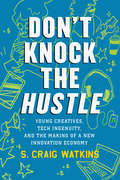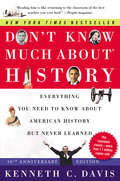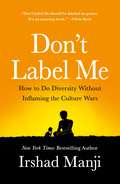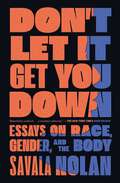- Table View
- List View
Dominican Republic (Enchantment Of The World)
by Barbara Radcliffe Rogers Lura Rogers Barbara RadcliffeThe highly regarded Cultures of the World ® series celebrates the diversity of other cultures in this fully updated and expanded edition. As has always been true of these outstanding titles, an abundance of vibrant photographs-including those new to this edition-stimulate the imaginations of young readers as they travel the globe.
Dominicans in New York City: Power From the Margins (Latino Communities: Emerging Voices - Political, Social, Cultural and Legal Issues)
by Milagros RicourtFirst published in 2002. Routledge is an imprint of Taylor & Francis, an informa company.
Dominion Built of Praise: Panegyric and Legitimacy Among Jews in the Medieval Mediterranean (Jewish Culture and Contexts)
by Jonathan DecterA constant feature of Jewish culture in the medieval Mediterranean was the dedication of panegyric texts in Hebrew, Judeo-Arabic, and other languages to men of several ranks: scholars, communal leaders, courtiers, merchants, patrons, and poets. Although the imagery of nature and eroticism in the preludes to these poems is often studied, the substance of what follows is generally neglected, as it is perceived to be repetitive, obsequious, and less aesthetically interesting than other types of poetry from the period. In Dominion Built of Praise, Jonathan Decter demurs. As is the case with visual portraits, panegyrics operate according to a code of cultural norms that tell us at least as much about the society that produced them as the individuals they portray. Looking at the phenomenon of panegyric in Mediterranean Jewish culture from several overlapping perspectives—social, historical, ethical, poetic, political, and theological—he finds that they offer representations of Jewish political leadership as it varied across geographic area and evolved over time.Decter focuses his analysis primarily on Jewish centers in the Islamic Mediterranean between the tenth and thirteenth centuries and also includes a chapter on Jews in the Christian Mediterranean through the fifteenth century. He examines the hundreds of panegyrics that have survived: some copied repeatedly in luxurious anthologies, others discarded haphazardly in the Cairo Geniza. According to Decter, the poems extolled conventional character traits ascribed to leaders not only diachronically within the Jewish political tradition but also synchronically within Islamic and, to a lesser extent, Christian civilization and political culture. Dominion Built of Praise reveals more than a superficial and functional parallel between Muslim and Jewish forms of statecraft and demonstrates how ideas of Islamic political legitimacy profoundly shaped the ways in which Jews conceptualized and portrayed their own leadership.
Dominoes Game Night: 65 Classic Games to Entertain and Excite
by Travis NewsomeIn this comprehensive guide, a 3-time World Domino Champion breaks down the fascinating history and culture of one of the world's most popular pastimes—and shares how-to instructions for playing 65 different domino games. Featuring step-by-step, illustrated instructions, Dominoes Game Night will teach readers how to play 65 different domino games, including popular variations like Matador, Muggins, Chicken Foot, and Mexican Train. In addition to providing the rules of standard game play, Dominoes Game Night also delves into the 1,000+ year history and culture of the game across the world, and it looks at modern day domino tournaments that are played both in person and online. Also touching on more idiosyncratic domino uses like toppling, Dominoes Game Night introduces readers to the countless benefits of playing Dominoes—like improved memory retention and concentration—while also teaching discipline and bolstering social interactions. With a breakdown of Dominoes terms, rules, and turn-by-turn examples, this book explains the reasoning behind making specific plays, and it takes an in-depth look at the critical thinking and deductive reasoning skills that are required to master the game. Whether you're a novice who is just learning to play, or an experienced player looking to elevate your game, Dominoes Game Night offers all the tools you need to consistently win games at a higher level. Written by a 3-time World Domino Champion, Dominoes Game Night is sure to become the go-to companion for both casual players and Domino die-hards.
Doméstica
by Pierrette Hondagneu-SoteloIn this enlightening and timely work, Pierrette Hondagneu-Sotelo highlights the voices, experiences, and views of Mexican and Central American women who care for other people's children and homes, as well as the outlooks of the women who employ them in Los Angeles. The new preface looks at the current issues facing immigrant domestic workers in a global context.
Domínio: Como o Cristianismo Transformou o Pensamento Ocidental
by Tom HollandUm livro fundamental que mostra como a revolução cristã mudou o mundo O Cristianismo é o legado mais influente e duradouro da Antiguidade, e o seu surgimento constitui a revolução mais radical da história do Ocidente. O impacto da religião cristã deixou a sua marca em todos os campos do desenvolvimento humano. Consequentemente, apesar do número crescente de pessoas que abandonam esta fé na atualidade, viver num país moderno é viver numa sociedade cujos instintos e tradições têm profundas raízes cristãs. Neste livro, o historiador Tom Holland relata como chegámos ao presente e como a mente ocidental foi moldada num contexto histórico mais amplo. Numa análise reveladora que se estende desde a invasão persa da Grécia em 480 a. C. até às atuais crises migratórias na Europa, o autor explica por que motivo o Cristianismo foi e é uma força revolucionária e de que modo transformou radicalmente o que significa ser humano. «Se os grandes livros nos encorajam aolhar para o mundo de um modo completamente novo, então Domínio é, sem dúvida, um grande livro.» The Sunday Times
Don Juan of Persia: A Shi'ah Catholic 1560-1604
by Don JuanFirst published in 1926. Don Juan was a Persian Moslem who became a Spanish Roman Catholic. His description of Persia and his account of the wars waged by the Persians during the sixteenth century considerably add to modern day knowledge of the history of the period. The book describes the Safavi rule as first established, and the system of government set up in the prime of Sháh 'Abbás, as well as being an account of the long journey from Isfahán to Valladolid. Guy Le Strange's comprehensive introduction places the book in its historical context, as well as providing important information on how the book was written. Many of the inaccuracies of the original text are corrected in translation with references and notes added to the index to guide the reader.
Don Mills: From Forests and Farms to Forces of Change
by Scott KennedyHow Toronto’s own city farms were crowded out First settled in the early nineteenth century, the area now known as Don Mills retained its rural character until the end of the Second World War. After the war, population growth resulted in pressure to develop the area around Toronto and, in a relatively short time, the landscape of Don Mills was irreparably altered. Today, the farms are all gone, as are almost all of the barns and farmhouses. Fields and forests have been replaced by the industries, homes, and shops of Canada’s “first subdivision.” In Don Mills: From Forests and Farms to Forces of Change, author Scott Kennedy remembers Don Mills as it was and takes great care to make sure that the farms and farmers are not forgotten.
Don't Accept Me as I Am: Helping Retarded Performers Excel
by Reuven Feuerstein Yaacov RandHow to help a retarded child develop, how mental retardation can be remediated.
Don't Be Evil: How Big Tech Betrayed Its Founding Principles -- and All of Us
by Rana ForooharA penetrating indictment of how today&’s largest tech companies are hijacking our data, our livelihoods, our social fabric, and our minds—from an acclaimed Financial Times columnist and CNN analyst &“Don&’t be evil&” was enshrined as Google&’s corporate mantra back in its early days, when the company&’s cheerful logo still conveyed the utopian vision for a future in which technology would inevitably make the world better, safer, and more prosperous. Unfortunately, it&’s been quite a while since Google, or the majority of the Big Tech companies, lived up to this founding philosophy. Today, the utopia they sought to create is looking more dystopian than ever: from digital surveillance and the loss of privacy to the spreading of misinformation and hate speech to predatory algorithms targeting the weak and vulnerable to products that have been engineered to manipulate our desires. How did we get here? How did these once-scrappy and idealistic enterprises become rapacious monopolies with the power to corrupt our elections, co-opt all our data, and control the largest single chunk of corporate wealth—while evading all semblance of regulation and taxes? In Don&’t Be Evil, Financial Times global business columnist Rana Foroohar tells the story of how Big Tech lost its soul—and ate our lunch. Through her skilled reporting and unparalleled access—won through nearly thirty years covering business and technology—she shows the true extent to which behemoths like Google, Facebook, Apple, and Amazon are monetizing both our data and our attention, without us seeing a penny of those exorbitant profits. Finally, Foroohar lays out a plan for how we can resist, by creating a framework that fosters innovation while also protecting us from the dark side of digital technology.Advance praise for Don&’t Be Evil&“At first sight, Don&’t Be Evil looks like it&’s doing for Google what muckraking journalist Ida Tarbell did for Standard Oil over a century ago. But this whip-smart, highly readable book&’s scope turns out to be much broader. Worried about the monopolistic tendencies of big tech? The addictive apps on your iPhone? The role Facebook played in Donald Trump&’s election? Foroohar will leave you even more worried, but a lot better informed.&”—Niall Ferguson, Milbank Family Senior Fellow at the Hoover Institution, Stanford, and author of The Square and the Tower
Don't Be a Jerk: And Other Practical Advice from Dogen, Japan's Greatest Zen Master
by Brad WarnerThe Shōbōgenzō (The Treasury of the True Dharma Eye) is a revered eight-hundred-year-old Zen Buddhism classic written by the Japanese monk Eihei Dōgen. Despite the timeless wisdom of his teachings, many consider the book difficult to understand and daunting to read. In Don’t Be a Jerk, Zen priest and bestselling author Brad Warner, through accessible paraphrasing and incisive commentary, applies Dōgen’s teachings to modern times. While entertaining and sometimes irreverent, Warner is also an astute scholar who sees in Dōgen very modern psychological concepts, as well as insights on such topics as feminism and reincarnation. Warner even shows that Dōgen offered a “Middle Way” in the currently raging debate between science and religion. For curious readers worried that Dōgen’s teachings are too philosophically opaque, Don’t Be a Jerk is hilarious, understandable, and wise.
Don't Believe It!: How Lies Become News
by Alexandra KittyDo you think shamed journalists Jayson Blair and Stephen Glass were rare bad apples? Far from it, they were just the ones stupid enough to get caught. Alexandra Kitty demonstrates with example upon example how manufactured news is endemic in our media and shows the reader how to spot suspicious stories.In the last few years, the journalism industry has cut costs by eliminating important safeguards: companies have reduced the number of fact-checkers, editors, and journalists. What this means is that editors and reporters cannot spend time verifying information. Moreover, journalists are not required to have professional experience or training to cover their beats. Fierce competition to get a scoop may lead to journalists making careless errors or not double-checking information.To maintain audiences and readership, journalists, editors and producers will choose sensational stories that shock. Combined with time and budget constraints, journalists may unwittingly or deliberately disseminate false or misleading information to the public. It is important to get a story, interview a subject or nab a scoop firstthe accuracy of these elements is secondary. Competition from other media outlets also means the goal of a journalist is to get the scoop firsthow it makes it on the air (flawed, inaccurate, questionably obtained) is unimportant.Dont Believe It! teaches news consumers how to verify information. It shows readers how to evaluate sources, eyewitnesses and data. This is a comprehensive bible to information verification from a logical standpoint, showing how to be skeptical without being jaded, step by step, with case studies and a classification manual.
Don't Bet on the Prince: Contemporary Feminist Fairy Tales in North America and England
by Jack ZipesFirst published in 1987. Routledge is an imprint of Taylor & Francis, an informa company.
Don't Burn This Book: Thinking for Yourself in an Age of Unreason
by Dave RubinTHE NEW YORK TIMES BESTSELLER'Topical, engaging, personable, and above all, reassuring' Dr. Jordan B. PetersonFrom host of The Rubin Report, the most-watched talk show about free speech and big ideas on YouTube right now, a roadmap for free thinking in an increasingly censored world.The left is no longer liberal.Once on the side of free speech and tolerance, progressives now ban speakers from college campuses, "cancel" people who aren't up to date on the latest genders, and force religious people to violate their conscience. They have abandoned the battle of ideas and have begun fighting a battle of feelings. This uncomfortable truth has turned moderates and true liberals into the politically homeless class.Dave Rubin launched his political talk show The Rubin Report in 2015 as a meeting ground for free thinkers who realize that partisan politics is a dead end. He hosts people he both agrees and disagrees with--including those who have been dismissed, deplatformed, and despised--taking on the most controversial issues of our day. As a result, he's become a voice of reason in a time of madness.Now, Rubin gives you the tools you need to think for yourself in an age when tribal outrage is the only available alternative. Based on his own story as well as his experiences from the front lines of the free speech wars, this book will empower you to make up your own mind about what you believe on any issue and teach you the fine art of: Checking your facts, not your privilege, when it comes to today's most pervasive myths, from the wage gap to hate crimes. Standing up to the mob against today's absurd PC culture, when differences of opinion can bring relationships, professional or personal, to a sudden end. Defending classically liberal principles such as individual rights and limited government, because freedom is impossible without them.The Progressive Woke Machine is waging war against the last free thinkers in the world. Don't Burn This Book is the definitive account of our current political upheaval and your guide to surviving it.
Don't Burn This Book: Thinking for Yourself in an Age of Unreason
by Dave RubinTHE NEW YORK TIMES BESTSELLER'Topical, engaging, personable, and above all, reassuring' Dr. Jordan B. PetersonFrom host of The Rubin Report, the most-watched talk show about free speech and big ideas on YouTube right now, a roadmap for free thinking in an increasingly censored world.The left is no longer liberal.Once on the side of free speech and tolerance, progressives now ban speakers from college campuses, "cancel" people who aren't up to date on the latest genders, and force religious people to violate their conscience. They have abandoned the battle of ideas and have begun fighting a battle of feelings. This uncomfortable truth has turned moderates and true liberals into the politically homeless class.Dave Rubin launched his political talk show The Rubin Report in 2015 as a meeting ground for free thinkers who realize that partisan politics is a dead end. He hosts people he both agrees and disagrees with--including those who have been dismissed, deplatformed, and despised--taking on the most controversial issues of our day. As a result, he's become a voice of reason in a time of madness.Now, Rubin gives you the tools you need to think for yourself in an age when tribal outrage is the only available alternative. Based on his own story as well as his experiences from the front lines of the free speech wars, this book will empower you to make up your own mind about what you believe on any issue and teach you the fine art of: Checking your facts, not your privilege, when it comes to today's most pervasive myths, from the wage gap to hate crimes. Standing up to the mob against today's absurd PC culture, when differences of opinion can bring relationships, professional or personal, to a sudden end. Defending classically liberal principles such as individual rights and limited government, because freedom is impossible without them.The Progressive Woke Machine is waging war against the last free thinkers in the world. Don't Burn This Book is the definitive account of our current political upheaval and your guide to surviving it.
Don't Call Me Inspirational: A Disabled Feminist Talks Back
by Harilyn RoussoFor psychotherapist, painter, feminist, filmmaker, writer, and disability activist Harilyn Rousso, hearing well-intentioned people tell her, "Youre so inspirational " is patronizing, not complimentary. In her empowering and at times confrontational memoir, "Dont Call Me Inspirational," Rousso, who has cerebral palsy, describes overcoming the prejudice against disability--not overcoming disability. She addresses the often absurd and ignorant attitudes of strangers, friends, and family. Rousso also examines her own prejudice toward her disabled body, and portrays the healing effects of intimacy and creativity, as well as her involvement with the disability rights community. She intimately reveals herself with honesty and humor and measures her personal growth as she goes from "passing" to embracing and claiming her disability as a source of pride, positive identity, and rebellion. A collage of images about her life, rather than a formal portrait, "Dont Call Me Inspirational" celebrates Roussos wise, witty, productive, outrageous life, disability and all.
Don't Call Me Princess: Essays on Girls, Women, Sex and Life
by Peggy OrensteinThe New York Times bestselling author of Girls & Sex and Cinderella Ate My Daughter delivers her first ever collection of essays—funny, poignant, deeply personal and sharply observed pieces, drawn from three decades of writing, which trace girls’ and women’s progress (or lack thereof) in what Orenstein once called a “half-changed world.” Named one of the “40 women who changed the media business in the last 40 years” by Columbia Journalism Review, Peggy Orenstein is one of the most prominent, unflinching feminist voices of our time. Her writing has broken ground and broken silences on topics as wide-ranging as miscarriage, motherhood, breast cancer, princess culture and the importance of girls’ sexual pleasure. Her unique blend of investigative reporting, personal revelation and unexpected humor has made her books bestselling classics.In Don’t Call Me Princess, Orenstein’s most resonant and important essays are available for the first time in collected form, updated with both an original introduction and personal reflections on each piece. Her takes on reproductive justice, the infertility industry, tensions between working and stay-at-home moms, pink ribbon fear-mongering and the complications of girl culture are not merely timeless—they have, like Margaret Atwood’s The Handmaid’s Tale, become more urgent in our contemporary political climate. Don’t Call Me Princess offers a crucial evaluation of where we stand today as women—in our work lives, sex lives, as mothers, as partners—illuminating both how far we’ve come and how far we still have to go.
Don't Follow Your Heart: Boldly Breaking the Ten Commandments of Self-Worship
by Thaddeus J. WilliamsWhy chasing after expressive individualism, experiences, and desires always fails to deliver on its promise of happiness.Today we are told to be true to ourselves, look within for answers, and follow our hearts. But when we put our own happiness first, we experience record-breaking levels of aimlessness, loneliness, depression, and anxiety. Self-centeredness always fails to deliver the fulfillment we're seeking.In Don't Follow Your Heart, Thaddeus Williams debunks the "ten commandments of self-worship," which include popular propaganda, like:#liveyourbestlife: Thou shalt always act in accord with your chief end—to glorify and enjoy yourself forever.#followyourheart: Thou shalt obey your emotions at all costs.#yolo: Thou shalt pursue the rush of boundary-free experience.Williams builds a case that this type of self-worship is not authentic, satisfying, or edgy. Instead, its rehashing what is literally humanity's oldest lie. He calls on a new generation of mavericks and renegades, heretics who refuse to march in unison with the self-obsessed herd. With a fascinating blend of theology, philosophy, science, psychology, and pop culture, Williams points us to a life beyond self-defeating dogmas to a more meaningful life centered on Someone infinitely more interesting, satisfying, and awesome than ourselves.Featuring stories from Carl Trueman, Joni Eareckson Tada, J.P, Moreland, Josh McDowell, Alisa Childers, and more."Following the herd is leading our generation off a cliff. Maybe a little heresy can do us a lot of good." —Collin Hansen
Don't Go: Stories of Segregation and How to Disrupt It
by Maria Krysan Tonika Lewis JohnsonMultiple times a day, in cities across the US and beyond, a simple yet powerful message is repeated by the well-meaning, the ignorant, and the bigoted: “don’t go” – avoid at all costs those Black and Brown disinvested neighborhoods that have become bywords for social disorder and urban decay.This book is a collection of intimate stories and evocative photos that uncover the hidden influence of both subtle and overt “don’t go” messages and the segregation they perpetuate in Chicago. Told by everyday people to Tonika Lewis Johnson and Maria Krysan – a Black artist and a White academic who met through their shared passion for anti-segregation work – the stories paint a rich picture of life in a segregated city.One by one, the storytellers upend pessimism with candid, deeply personal, humorous, and heartbreaking tales, and with novel ideas for simple actions that can serve as antidotes to both racism and “place-ism.” By inviting readers into the lives of regular people who have ignored the warning to stay away from “don’t go” neighborhoods or who live in those very same neighborhoods, the stories in Don’t Go illuminate the devastating consequences of racial segregation and disinvestment as well as the inevitable rewards of coming together.
Don't Kill in Our Names: Families of Murder Victims Speak Out Against the Death Penalty
by Rachel KingThe stories of family members of murder victims who seek healing and reconciliation over vengeance and work to end the use of capital punishment.
Don't Kill the Birthday Girl: Tales from an Allergic Life
by Sandra BeasleyA beautifully written and darkly funny journey through the world of the allergic. Like twelve million other Americans, Sandra Beasley suffers from food allergies. Her allergies--severe and lifelong--include dairy, egg, soy, beef, shrimp, pine nuts, cucumbers, cantaloupe, honeydew, mango, macadamias, pistachios, cashews, swordfish, and mustard. Add to that mold, dust, grass and tree pollen, cigarette smoke, dogs, rabbits, horses, and wool, and it's no wonder Sandra felt she had to live her life as "Allergy Girl." When butter is deadly and eggs can make your throat swell shut, cupcakes and other treats of childhood are out of the question--and so Sandra's mother used to warn guests against a toxic, frosting-tinged kiss with "Don't kill the birthday girl!" It may seem that such a person is "not really designed to survive," as one blunt nutritionist declared while visiting Sandra's fourth-grade class. But Sandra has not only survived, she's thrived--now an essayist, editor, and award-winning poet, she has learned to navigate a world in which danger can lurk in an unassuming corn chip. Don't Kill the Birthday Girl is her story. With candor, wit, and a journalist's curiosity, Sandra draws on her own experiences while covering the scientific, cultural, and sociological terrain of allergies. She explains exactly what an allergy is, describes surviving a family reunion in heart-of-Texas beef country with her vegetarian sister, delves into how being allergic has affected her romantic relationships, exposes the dark side of Benadryl, explains how parents can work with schools to protect their allergic children, and details how people with allergies should advocate for themselves in a restaurant. A compelling mix of memoir, cultural history, and science, Don't Kill the Birthday Girl is mandatory reading for the millions of families navigating the world of allergies--and a not-to-be-missed literary treat for the rest of us.From the Hardcover edition.
Don't Knock the Hustle: Young Creatives, Tech Ingenuity, and the Making of a New Innovation Economy
by Craig S. WatkinsHow millennials are changing our ideas about work, the "gig economy", social mobility, opportunity and technologyMillennials are coming of age at a time when work is temporary, underpaid, incommensurate with their education, or downright unsatisfying. Despite these challenges, media scholar S. Craig Watkins argues that this moment of precarity is rife with opportunities for innovation, and that millennials are leading the charge at turning that into an inventive and surprisingly sustainable future.At the intersection of ethnography, sociology, social history and pop culture, Don't Knock the Hustle is one of the first attempts to document how millennials are building a creative, entrepreneurial, and civically engaged innovation economy. Here, we meet people like Prince Harvey, a hip hop artist who recorded his album entirely on an Apple showroom laptop; screenwriter, producer and actor Issa Rae, who first used YouTube and Kickstarter to develop the web series that became her hit HBO show, Insecure; and start-up companies like Qeyno Group in San Francisco and Juegos Rancheros in Austin, TX that help make tech more accessible to people of color. Don't Knock the Hustle offers a timely analysis of the sheer ingenuity and persistence of young people who cobble together the resources they need to pursue the lives and careers they want.Drawing on over ten years of interviews and data, Watkins reveals the radical ways in which our society is expanding who we think of as innovators, what qualifies as innovation, and the spread of wealth beyond traditional corridors of powerful tech companies, venture capitalism, and well-endowed universities. Forward-thinking and dynamic, Don't Knock the Hustle shows the diversity and complexity of a generation on the rise.
Don't Know Much About History [30th Anniversary Edition]: Everything You Need to Know About American History but Never Learned
by Kenneth C DavisA New York Times bestseller · More than 1.7 Million Copies Sold!“Reading Davis is like returning to the classroom of the best teacher you ever had!” —People magazineFrom the arrival of Columbus through the historic election of Barack Obama and beyond, Kenneth C. Davis carries readers on a rollicking ride through more than five hundred years of American history. In this 30th anniversary edition of the classic anti-textbook—which includes a new preface by Davis—he debunks, recounts, and serves up the real story behind the myths and fallacies of American history.
Don't Label Me: An Incredible Conversation for Divided Times
by Irshad Manji"Don't Label Me should be labeled as genius. It's an amazing book." - Chris RockA unique conversation about diversity, bigotry, and our common humanity, by the New York Times bestselling author, Oprah “Chutzpah” award-winner, and founder of the Moral Courage Project In these United States, discord has hit emergency levels. Civility isn't the reason to repair our caustic chasms. Diversity is. Don't Label Me shows that America's founding genius is diversity of thought. Which is why social justice activists won't win by labeling those who disagree with them. At a time when minorities are fast becoming the majority, a truly new America requires a new way to tribe out.Enter Irshad Manji and her dog, Lily. Raised to believe that dogs are evil, Manji overcame her fear of the "other" to adopt Lily. She got more than she bargained for. Defying her labels as an old, blind dog, Lily engages Manji in a taboo-busting conversation about identity, power, and politics. They're feisty. They're funny. And in working through their challenges to one another, they reveal how to open the hearts of opponents for the sake of enduring progress. Readers who crave concrete tips will be delighted. Studded with insights from epigenetics and epistemology, layered with the lessons of Bruce Lee, Ben Franklin, and Audre Lorde, punctuated with stories about Manji's own experiences as a refugee from Africa, a Muslim immigrant to the U.S., and a professor of moral courage, Don't Label Me makes diversity great again.
Don't Let It Get You Down: Essays on Race, Gender, and the Body
by Savala NolanA powerful and provocative collection of essays that offers poignant reflections on living between society’s most charged, politicized, and intractably polar spaces—between black and white, rich and poor, thin and fat. <p><p> Savala Nolan knows what it means to live in the in-between. Descended from a Black and Mexican father and a white mother, Nolan’s mixed-race identity is obvious, for better and worse. At her mother’s encouragement, she began her first diet at the age of three and has been both fat and painfully thin throughout her life. She has experienced both the discomfort of generational poverty and the ease of wealth and privilege. It is these liminal spaces—of race, class, and body type—that the essays in Don’t Let It Get You Down excavate, presenting a clear and nuanced understanding of our society’s most intractable points of tension. <p><p> The twelve essays that comprise this collection are rich with unforgettable anecdotes and are as humorous and as full of Nolan’s appetites as they are of anxieties. The result is lyrical and magnetic. In “On Dating White Guys While Me,” Nolan realizes her early romantic pursuits of rich, preppy white guys weren’t about preference, but about self-erasure. In the titular essay “Don’t Let it Get You Down,” we traverse the cyclical richness and sorrow of being Black in America as Black children face police brutality, “large Black females” encounter unique stigma, and Black men carry the weight of other people’s fear. In “Bad Education,” we see how women learn to internalize rage and accept violence in order to participate in our culture. And in “To Wit and Also” we meet Filliss, Grace, and Peggy, the enslaved women owned by Nolan’s white ancestors, reckoning with the knowledge that America’s original sin lives intimately within our present stories. <p><p> Over and over again, Nolan reminds us that our true identities are often most authentically lived not in the black and white, but in the grey of the in-between. Perfect for fans of Heavy by Kiese Laymon and Bad Feminist by Roxane Gay, Don’t Let It Get You Down delivers an essential perspective on race, class, bodies, and gender in America today.
